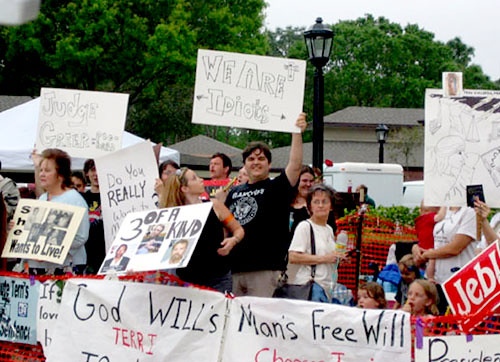Terri Schiavo Case Was a Culture-of-Death Tipping Point
Originally published at The Epoch TimesThe March 31, 2005, court-ordered death of Terri Schiavo was an ominous cultural tipping point. As many readers will recall, the legal case began when Terri’s husband Michael Schiavo applied to remove the feeding tube from his profoundly cognitively disabled wife so that she would die by dehydration. When Terri’s parents Bob and Mary Schindler, joined by her siblings Bobby and Suzanne, fought the plan in court, profoundly important cultural and legal battle lines were drawn that were destined to change the country.
The legal battle raged for several years during which the country agonized and argued about the right and moral course. When her case began, few were aware that cognitively disabled patients could legally be made to die via the removal of feeding tubes. A few years later, after Terri’s family (in alliance with the disability rights and pro-life organizations) failed to save her life, this form of quasi-euthanasia was endorsed by polling majorities.
The public’s general acceptance of Terri’s dehydration followed a familiar pattern often seen as the culture-of-death slippery slope slip slides away. Initially, most people were shocked. But as the media pounded the drum in support of Michael, attitudes changed. This cultural shift was aided by prominent bioethicists and politicians assuring the public that taking away Terri’s feeding tube was not only legal—true—but ethically justified. By the time Terri was made to die agonizingly over two weeks—and despite Terri’s brother stating that she had become so desiccated blood was pooling in her eyes—most of the country became convinced that her forced death was both right and compassionate.
Looking back nearly 20 years later, Terri’s case can be judged as a cultural cudgel that crushed the sanctity of life. These days, society’s primary purpose is popularly understood to be the prevention and elimination of suffering—even if that means eliminating the sufferer. In this nihilistic climate, killing—when supposedly motivated by “compassion”—often finds strong public support.
This shift has led to radical changes in our laws. When Terri died, only Oregon had legalized assisted suicide. Today, nine jurisdictions have passed statutes allowing doctors to prescribe lethal drugs to dying patients (Oregon, Hawaii, Colorado, New Mexico, Maine, New Jersey, Vermont, California, plus the District of Columbia). These states encompass about one-third of the U.S. population.
Not only that, but most of these states have already begun the slippery slope process of expanding access to assisted suicide from that originally permitted, such as shortened waiting periods, allowing doctors to examine assisted suicide requesters over the Internet rather than in person, and allowing nurse practitioners to lethally prescribe. Vermont has done away with its residency requirements—likely followed soon by Oregon—opening the door to “suicide tourism” and potentially allowing patients throughout the nation to receive lethal doses who never meet the prescribing doctor in the flesh, or even enter the state.
Meanwhile, the euthanasia movement is striving to increase the number of jurisdictions that permit doctors to assist suicides. This year, there will be fraught political battles over assisted suicide legalization in New York, Rhode Island, Connecticut, Massachusetts, Minnesota, and Maryland, just to name a few.
Not content to await such changes, euthanasia advocacy groups promote suicide by self-starvation/dehydration to the elderly and people with disabilities, known in movement parlance as VSED (“voluntary stopping eating and drinking”). VSED is a form of quasi-assisted suicide. Starving oneself is an agonizing way to die—as it clearly was for Terri Schiavo if she was in any way conscious—so a doctor is usually required to palliate the agony. Otherwise, most people can’t complete the process.
Activists also promote “VSED by advance directive” for patients who willingly eat and drink. The idea is to allow people to create written legally binding documents ordering themselves starved to death should they become incompetent. Under these proposals, caregivers would be required to refuse sustenance to their patients—even if the patient asked for food and water—under the theory that the decision by the formerly competent patient should apply whether the person still wants to starve or not.
How bad could this death agenda get? Canada—our closest cultural cousin—provides an alarming illustration. Our northern neighbor not only allows lethal injection euthanasia, but patients need not be terminally ill to qualify. Thus, lonely, frail elderly patients have been killed by doctors, as well as people with disabilities and chronic diseases—even the depressed. Next year the mentally ill are scheduled to be qualified legally for euthanasia, and the move is also afoot to allow children to be killed—perhaps without their parents’ knowledge or permission if doctors deem the child to be sufficiently “mature.” Not only that, but in Ontario, someone who has been accepted for euthanasia will be contacted by an organ transplant charity and asked for their liver, heart, pancreas, and kidneys.
If the same awful death paradigm develops here, the Terri Schiavo debacle will have paved the way. In the years since society nodded at the dehydration death of a helpless woman, we can trace a profound lessening in our commitment to the value of human life, along with a concomitant increase in poisonous utilitarianism in health care. Indeed, the day may soon come when killing seriously ill, elderly, and severely disabled patients is not merely seen as a legitimate “end-of-life choice,” but also a normalized way of death.
